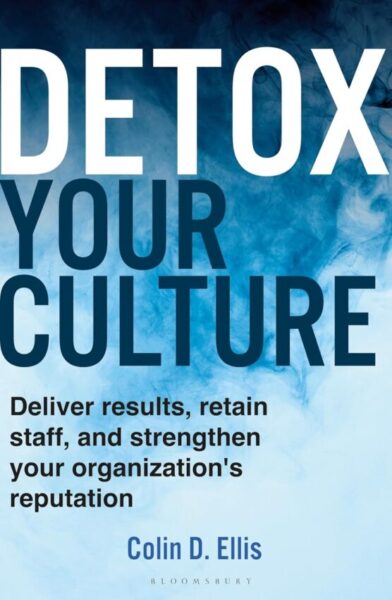The ‘work hard/play hard’ cliché of big companies is antiquated and harmful, leading to toxic workplace cultures that in turn impact the bottom line.
It’s time to drop the antiquated ideas and begin the process of revitalizing the work culture, says workplace culture expert and bestselling author Colin D. Ellis.
“What we need, Colin,” said the CEO, as they leaned back in their chair ahead of a culture workshop I was leading, “… is a good, old-fashioned, work hard/play hard culture.”
This is a mantra that’s been embraced by many organisations, promising a high-octane environment where employees put in long hours and then let off steam with boozy off-site retreats or raucous happy hours spilling out onto pub-side pavements, talking about a ‘job well done’.
Yet beneath the surface of this worn-out cliché lies a troubling truth: it’s a recipe for burnout, disengagement, and a toxic work culture that ultimately harms the bottom line.
The ‘work hard’ part of the equation often translates into a cycle of overwork, where employees are expected to sacrifice their personal lives and wellbeing in the name of productivity. This relentless grind can lead to physical and mental exhaustion, increased stress levels, and a heightened risk of burnout. And when burnout sets in, it’s not just the employees who suffer—the organisation feels the impact through employee absence, decreased motivation, creativity, performance and, ultimately, missed results.
But it’s the ‘play hard’ component that truly reveals the insidious nature of this cliché. Too often, the idea of ‘playing hard’ is code for excessive drinking, partying, and a general erosion of professionalism. This celebration of excess can breed an environment where inappropriate behaviour is tolerated, or even encouraged, under the guise of ‘letting off steam’. From sexual harassment to substance abuse, the consequences of this toxic culture can be far-reaching … and devastating.
As recently as the 2010s, these behaviours were seen as part and parcel of everyone’s working life, as evidenced by another all-too-common cliché, ‘If you can’t stand the heat, get out of the kitchen’. However, this is not the expectation anymore.
A safe, respectful working environment never used to be a requirement of all employees. Now, it very much is. The #MeToo movement reinforced this requirement and now toxic cultures—and the leaders that preside over them—are being called out the world over.
This not only affects the reputation of the leaders that preside over these cultures but also affects share prices and revenue streams. Indeed, the Confederation of British Industry (CBI) in the UK almost went out of the business in 2022 as a result of its toxic culture and has still not fully recovered.
The work hard/play hard mentality reinforces a harmful dichotomy—that work and play are inherently separate and opposing forces, rather than complementary aspects of a balanced life.
This false dichotomy creates an unhealthy dynamic where employees feel they must oscillate between extremes, rather than finding a sustainable middle ground.
Yet, not only have attitudes changed, but the way that parents raise their children has too. My parents didn’t tell me to ‘find an employer who respects me and whose values match mine’, yet that is what we’re telling our children. We want better for them and we want better from the people who are creating the environments in which they’ll work.
So, how can organisations break free from this antiquated and damaging approach to work and create an organisation culture that’s fit for the future? Here are a few key points to consider, that I mentioned in conversation with the CEO:
Define a culture of respect: You get the culture you choose to define. Establish clear boundaries and expectations around professional conduct and create an environment where employees feel safe and respected. Zero tolerance for harassment, discrimination, or any behaviour that undermines the dignity and autonomy of others.
Lead by example: Leaders must embody the values and behaviours they wish to cultivate within the organisation. Model healthy work habits, set appropriate boundaries, and create an environment where employees feel empowered to do the same.
Promote work-life integration: Recognise that work and life are not separate entities but rather intertwined aspects of a whole. Encourage employees to find a healthy balance that allows them to thrive in both realms, without sacrificing one for the other.
Prioritise wellbeing: Shift the focus from overwork to sustainable productivity. Encourage employees to prioritise their physical and mental health, and provide resources to support their wellbeing, such as flexible work arrangements, mental health support, and wellness initiatives.
By embracing these principles, organisations can begin to dismantle the toxic work hard/play hard culture and cultivate a workplace that values sustainability, respect, and balance.
In doing so, they’ll not only improve the wellbeing and engagement of their employees but will also positively impact results and position the organisation for long-term success in an ever-changing world.
Detox Your Culture: Deliver results, retain staff, and strengthen your organization’s reputation (Bloomsbury UK) by Colin D. Ellis is out now on Amazon , priced £20 in hardcover, £18 as an eBook, and £15 as an audiobook. For more information, visit www.colindellis.com or follow Colin on LinkedIn, Instagram, Facebook, or YouTube.
Read more:
Why The Work Hard/Play Hard Mantra Is Damaging Your Bottom Line

